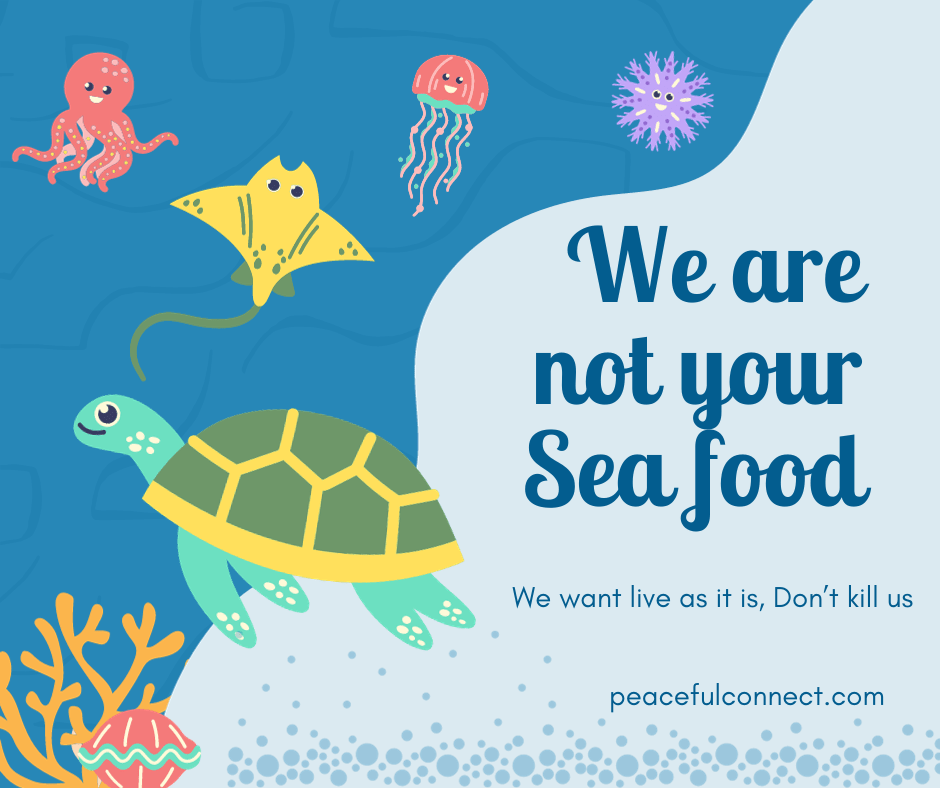
sea creatures are not your food
The vast expanse of our oceans, teeming with life and biodiversity, is facing an unprecedented threat – the relentless exploitation of its inhabitants for human consumption. In this article, we delve into the lives of ocean creatures, exploring their complex ecosystems and pleading for a paradigm shift in human behavior. It is time to recognize that sea creatures are not mere commodities; they are integral components of a delicate balance that sustains life on Earth.
Understanding Ocean Ecosystems:
The ocean, covering more than 70% of our planet, harbors an intricate web of life. From the smallest plankton to the majestic whales, every organism plays a crucial role in maintaining the health of our oceans. Sea creatures contribute to nutrient cycling, carbon absorption, and the regulation of global climate patterns. As we exploit these creatures for our culinary pleasures, we disrupt these delicate ecosystems, leading to irreversible consequences.
Sea Creatures Are Not Your Food:
It is imperative to emphasize that sea creatures are not your food. The oceans are not an endless buffet, and the relentless overfishing is pushing many species to the brink of extinction. By repeating the mantra, “Sea creatures are not your food,” we aim to drive home the message that these beings deserve respect and protection.
The Impact of Overfishing:
Overfishing, driven by the insatiable demand for seafood, is causing catastrophic consequences for marine life. The depletion of fish stocks disrupts the balance within ecosystems, leading to the decline of other species dependent on these fish. By recognizing that sea creatures are not your food, we can start implementing sustainable fishing practices that ensure the health and vitality of our oceans for future generations.
Coral Reefs: The Rainforests of the Sea:
Coral reefs, often referred to as the rainforests of the sea, are home to an astonishing diversity of marine life. Yet, destructive fishing methods, pollution, and climate change are causing irreparable damage to these vital ecosystems. By understanding that sea creatures are not your food, we can promote the conservation of coral reefs and protect the myriad species that call these vibrant habitats home.
Preserving Biodiversity:
The biodiversity of our oceans is a testament to the interconnectedness of life. Each species, no matter how small or seemingly insignificant, contributes to the intricate tapestry of ocean life. By respecting the fact that sea creatures are not your food, we can work towards preserving biodiversity and ensuring the resilience of marine ecosystems in the face of ongoing environmental challenges.
Also support to plantation for preserving biodiversity to ocean and our earth home.
The Role of Technology in Sustainable Fishing:
Advancements in technology offer promising solutions to address the crisis of overfishing. By implementing sustainable fishing practices, such as selective harvesting and using technology to track and monitor fish populations, we can protect marine life while still meeting the global demand for seafood. It is crucial to embrace these innovations and spread awareness that sea creatures are not your food.
The Ethical and Environmental Impact of Aquaculture:
While aquaculture is often touted as a solution to overfishing, it comes with its own set of challenges. Intensive fish farming can lead to pollution, the spread of diseases, and the depletion of wild fish stocks for feed. Acknowledging that sea creatures are not your food extends to the ethical considerations of aquaculture, urging us to pursue sustainable and ethical practices in this industry.
Global Collaboration for Ocean Conservation:
The conservation of our oceans requires a unified global effort. By recognizing that sea creatures are not your food, individuals, communities, and nations can come together to implement policies that promote sustainable fisheries, protect marine habitats, and combat pollution. International cooperation is essential to address the transboundary nature of ocean conservation and create a future where sea creatures thrive.
Educating the Masses:
Education is a powerful tool in changing perspectives and behaviors. By consistently reinforcing the message that sea creatures are not your food, we can create a cultural shift towards more sustainable and ethical choices. Schools, media, and advocacy groups play a vital role in disseminating information about the importance of preserving our oceans and respecting the inherent value of sea creatures.
Conclusion:
In conclusion, the time has come for humanity to reevaluate its relationship with the oceans and the creatures that inhabit them. By understanding that sea creatures are not your food, we can pave the way for a sustainable future where the beauty and diversity of our oceans are preserved for generations to come. Let us act as guardians of the deep, advocating for responsible and ethical practices that honor the intrinsic value of every ocean creature.
If you really love animal please read peta.org article here to save ocean creatures and animal.
